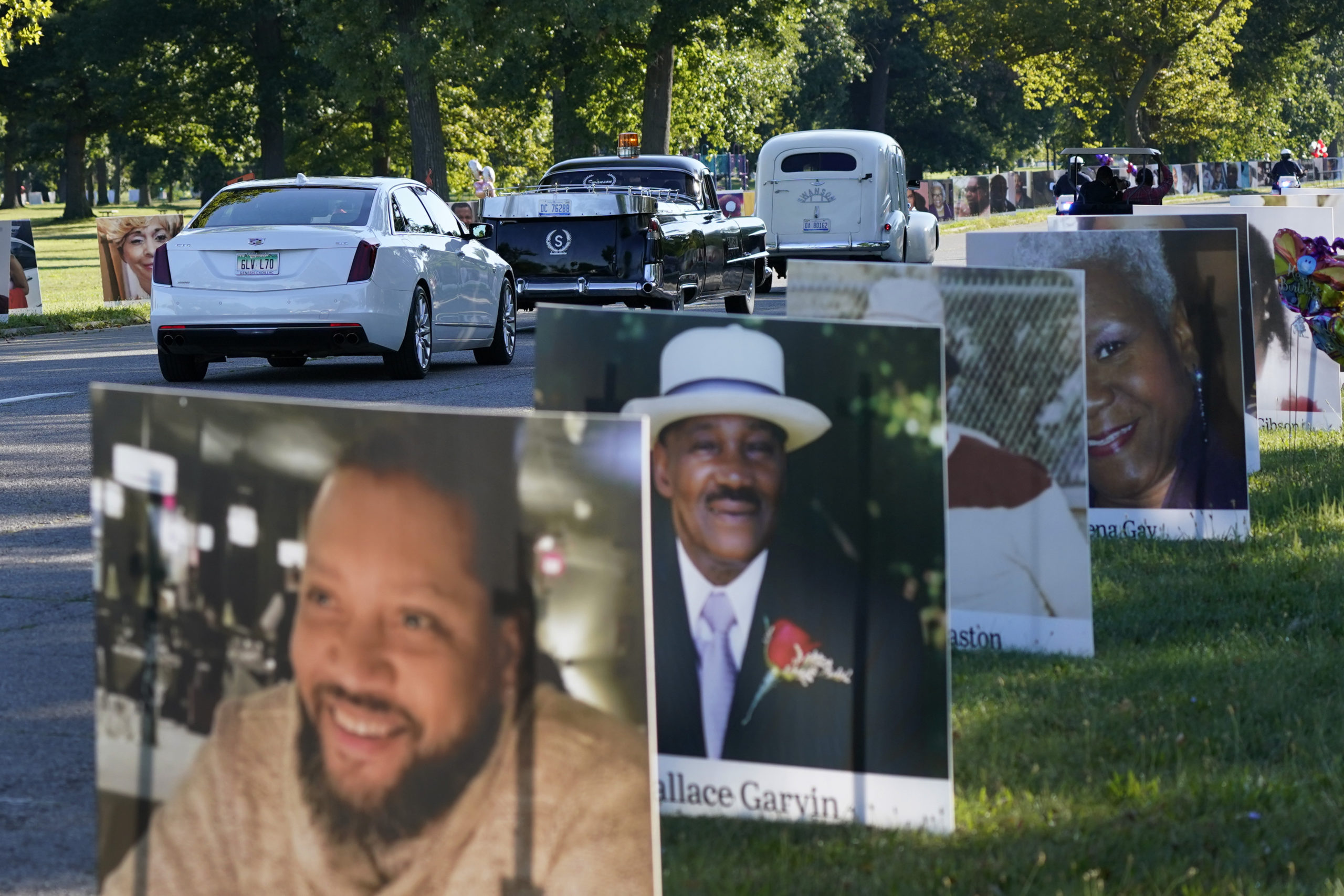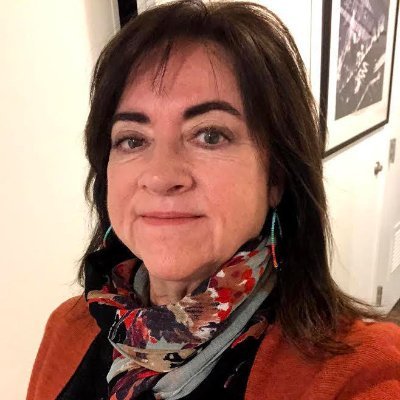
A procession of vehicles drive past photos of Detroit victims of COVID-19, Monday, Aug. 31, 2020 on Belle Isle in Detroit, Mich.
When I started to attend wakes as a girl, I told my father I didn’t know what to say or do.
It was simple, he said. You extended your hand and say, “I’m sorry for your troubles.”
He and my mother always showed up for wakes.
It was one of the ways they stayed close to the friends who, like them, came to America on long journeys by ocean liner. In the 1950s, before Skype or Zoom could have kept them connected to their native Ireland, friends became family.
When Bill and Peggy O’Donnell died, their friends showed up.
There were probably 600 people at each of my parents’ wakes and funerals. A good send-off, as the Irish say.
The Year of Covid took that away. Six people couldn’t come together to say goodbye, never mind 600.
I’ve been an obituary writer at the Chicago Sun-Times for about 12 years. But during the pandemic, I felt a new weight of responsibility. I’ve talked about it with other members of The Society of Professional Obituary Writers. We sensed that what we wrote was becoming a substitute for public mourning rituals.
A wake in words
The Covid-19 crisis has highlighted the value of obituaries in a time when newsrooms are shrinking, and obituaries often get outsourced. They reflect the history, identity, and values of the communities we cover. Readers and viewers respond to them. As we move forward into a (hopefully) post-pandemic world, it’s important to remember how journalists and news organizations — and obituaries — were part of getting through this crisis.
During the pandemic, I tried even harder to seek out quotes, not just from relatives of the deceased, but from their employers and friends and restaurant customers. From fellow tango dancers and gospel singers and dart players.
Social media — always an important source of early news alerts — became a lifeline and deathline. On March 17, 2020, Fiona Whelan Prine posted on Facebook that she’d tested positive for the coronavirus. I started watching for updates. Before her husband, John Prine, was a famous singer and songwriter admired by Bob Dylan and new Nashville stars, he worked as a mailman just outside Chicago.
Days after her post, Mr. Prine’s family revealed he was critically ill with the virus.
I started to write: John Prine’s lyrics were like Edward Hopper paintings. His songs conjured empty Greyhound stations, pawnshops, rusty railroad tracks, flies in the kitchen and nights with too much tequila.
I hoped the advance obituary would be left unused for years. I wanted to see John Prine perform again.
When he died, some people in Chicago felt as if they’d lost a relative.
As the pandemic continued, I could see, through paid death notices and social media, how our rituals were mutating. Grief was exacerbated by the absence of human touch. Elbow bumps felt inadequate, whether the cause of death was the coronavirus or something else. Often, obituary writers listened to people describing their pain at not being able to hug each other or wipe away tears.
I started writing about streamed graveside services and “wakes on wheels” — drive-thru wakes.
Funeral home parking lots no longer feature the orange cones that guided mourners past windows where they paid respects through glass. But I think streamed services and Zoom wakes are here to stay. Like obituaries, they offer vulnerable and immunocompromised people something precious and healing — the chance to connect and mourn with a community.
At the height of the pandemic, there were too many requests for obituaries to assign each one. I and other obit writers tried to bear witness to a world-changing calamity by writing about people of every social class, ethnicity, and profession.
A renewed commitment to diversity is the right thing to do. The popularity of the “Forgotten No More” feature in The New York Times, focusing on fascinating and influential people who never made it onto obituary pages dominated by the life stories of white men, proves this.
The pandemic emphasized the need to have professional journalists and trusted voices accurately reporting the news, offering platforms where people could turn in a time of historic isolation. It showed me the importance of strong local news organizations at a time when they are under great threat.
And it demonstrated that it’s critical to have the skill to draw out the essence of someone we’re writing about. Many of the people obituary writers speak to have never done a news interview before. English may not be their first, second, or third language.
Unless news organizations continue to invest in obituaries, the next time we have a crisis, one fundamental way of keeping people together — and informed — will be lost.
During the pandemic, a lot of obituary writers didn’t have any training for this kind of catastrophe.
We showed up.
And people opened up and spoke to me after I told them, “I’m sorry for your troubles.”
Maureen O’Donnell became the Chicago Sun-Times’ obituary writer in 2009. She served as president of the Society of Professional Obituary Writers from 2015-2018. Prior to becoming the paper’s obits writer, she spent 20 years as a general assignment reporter. Before joining the Sun-Times, she was a criminal courts reporter for the Milwaukee Journal Sentinel, an associate editor at Adweek magazine, and a reporter and editor at the City News Bureau of Chicago.

